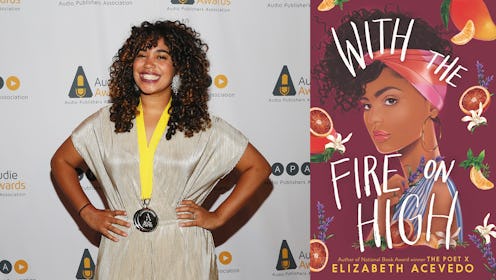Books
Start Reading From National Book Award Winner Elizabeth Acevedo's New Book

Poet and young adult author Elizabeth Acevedo took the literary world by storm in 2018 with her debut novel The Poet X, about Afro-Latina teen Xiomara Batista, who finds her voice through spoken-word poetry. The novel won the 2018 National Book Award for Young People's Literature and the 2018 Printz Award for Best Young Adult Novel, among others accolades, making it one of the most decorated YA novels of the last few years.
On May 7, 2019, Acevedo is publishing her second novel With the Fire On High, and she's hitting the road to sign books and talk to fans after it comes out. Bustle has all the details about Acevedo's upcoming book tour and an exclusive excerpt from her new book below!
With the Fire on High follows high school senior and single mom Emoni Santiago. With both her abuela and her young daughter to care for, Emoni only has one place where she can let her responsibilities go: the kitchen. But she knows she doesn't have time for her school’s new culinary arts class — and she definitely doesn't have money to pay for the class trip to Spain. But once Emoni starts cooking, she knows she has to let her talent break free.
Below, get the details on Acevedo's tour, which kicks off on May 7 in Washington, D.C. and will take the author to eight cities throughout the month. Then keep reading below for an exclusive excerpt from With the Fire on High:
Excerpt
I’ve lived my whole life having people question what race I am. Not necessarily the homies I grew up with. In Fairhill, we are mostly Spanish-speaking Caribbeans and Philly-raised Black Americans with roots in the South. Which means, in my hood everyone’s parents or great-grandparents got some kind of accent that ain’t a Philly one. But when people from a different neighborhood first meet me, they wonder why I don’t fit certain modes. The Latina grandmothers at the Papi store tsk-tsk when they ask me a question in Spanish and I answer with my chopped-up tongue, or worse, in English. And I don’t have enough skills to tell them ’Buela didn’t raise me speaking much Spanish. I can understand a lot of it because of her, but English is the language I learned at school and watched on TV and, for the most part, even the one we speak at home. I try not to be self-conscious about how little Spanish I know, but some days it feels like not speaking Spanish automatically makes me a Bad Boricua. One who’s forgotten her roots.
The Latina grandmothers at the Papi store tsk-tsk when they ask me a question in Spanish and I answer with my chopped-up tongue, or worse, in English.
But on the flip side, folks wonder if I’m Black American enough. As if my Puerto Rican side cancels out any Blackness, although if we go only according to skin, my Puerto Rican side is as Black as my Black American side. Not to mention, Julio may be a lot of things, but he sure is proud of his African roots and he’s made sure I never forget our history. And ’Buela doesn’t shy away from her Blackness either, even if she’s quieter with how she talks about it. I don’t know how many times someone has asked ’Buela for directions in the street and the moment they hear her accent a surprised “Oh, you Spanish?” slips out of their mouths.
I’m constantly having to give people geography and history lessons on how my grandmother’s hometown is 65 percent Afro–Puerto Rican, on how the majority of slaves were dropped off in the Caribbean and Latin America, on how just because our Black comes with bomba and mofongo doesn’t mean it isn’t valid. And it seems I’m always defending the parts of me that I’ve inherited from my mother: the roots that come from this country, the facts that Aunt Sarah tells me about our people in the Raleigh area, the little sayings she slips into her emails that I know come from her mother, and her mother’s mother, and her mother’s mother’s mother, to the first African mother who touched foot on this here land. The same wisdom I whisper to Babygirl every now and then, a reminder of where, and who, we are from.
This stuff is complicated. But it’s like I’m some long-division problem folks keep wanting to parcel into pieces, and they don’t hear me when I say: I don’t reduce, homies. The whole of me is Black. The whole of me is whole.